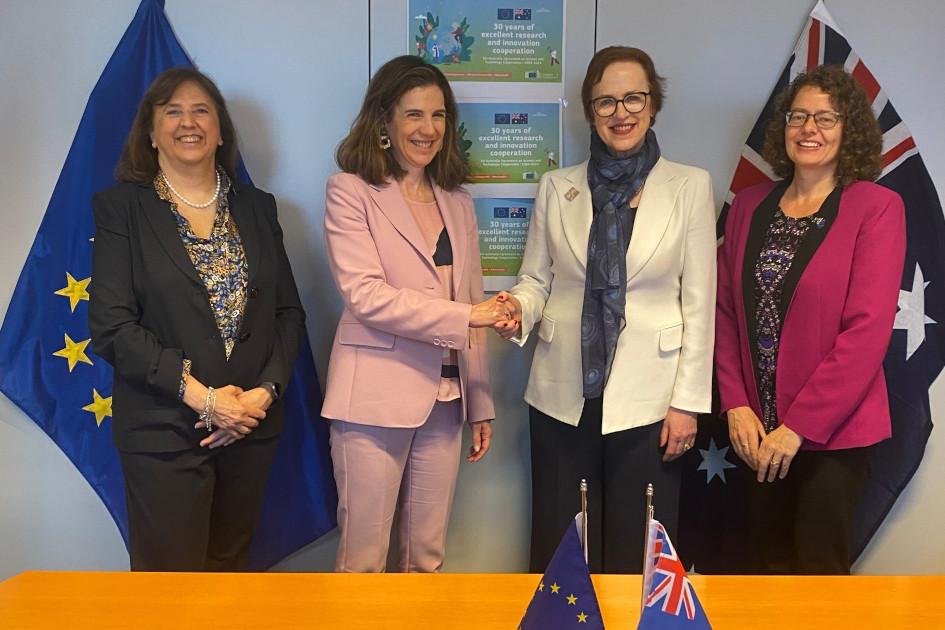
The EU-Australia Joint Science and Technology Cooperation Committee meeting that took place today in Brussels, was the occasion to reaffirm the commitment to science and technology cooperation while celebrating the 30th anniversary of the signature of the Agreement on Science and Technology Cooperation in 1994. Recognising the significance of fostering an environment characterised by freedom, independence, openness, reciprocity, and transparency, both sides confirmed their engagement in the Multilateral Dialogue on Principles and Values for Research and Innovation.
Iliana Ivanova, Commissioner for Innovation, Research, Culture, Education and Youth, said,
“From clean energy to health research, our partnership with Australia in science and technology has delivered tangible benefits to our people. The three decades of collaboration are a testament to our shared vision for a world where innovative breakthroughs pave the way for global prosperity. Let us continue working together on sustainable solutions that will address the challenges of our times.”
30 years of EU-Australia research and innovation collaboration yield positive results
Over three decades, the collaborative efforts between the European Union and Australia in research and innovation (R&I) have yielded remarkable outcomes across critical domains such as healthcare, sustainable energy, and research data sharing. This enduring partnership, driven by a shared commitment to fostering culture, education, and innovation, has propelled scientific advancements and technological solutions forward.
The EU R&I framework programmes have been a key element of this collaboration. Looking back over the 30-year span from FP4 (1994-1998), to the present Horizon Europe programme, a total of 749 grants have been signed, involving over 900 organizations, with Australian projects receiving €36.41 million in cumulative EU funding.
EU-Australia collaboration in energy transition, facilitated through Mission Innovation, underscores joint efforts to accelerate clean energy innovation amidst climate change challenges. Serving as co-chairs of the Mission Innovation Steering Committee, the European Commission and Australia jointly lead the Clean Hydrogen Mission, alongside other global partners. Australia's active involvement extends to co-leading missions like Net-Zero Industries and participating in initiatives such as Zero-Emissions Shipping and Carbon Dioxide Removal, demonstrating a shared commitment to addressing pressing environmental issues.
In health research, EU-Australia cooperation is robust, evidenced by joint initiatives like the EU Joint Programme - Neurodegenerative Disease Research, the Network of European Funding for Neuroscience Research, the Human Brain Project, and the International Initiative for Traumatic Brain Injury Research. Australia's commitment is further demonstrated through initiatives like the co-funding mechanism by the National Health and Medical Research Council (NHMRC), supporting collaborative research by providing funding to Australian organisations participating in Horizon Europe projects.
Additionally, the collaboration extends to international research and training programs like the Marie Skłodowska Curie Actions (MSCA), fostering exchanges and partnerships between researchers at various career stages. Across the seven years of the H2020 programme, 48 Australian organisations have participated in 184 MSCA projects, 611 MSCA researchers have been hosted in an Australian organisation, while the programme has also supported 259 Australian researchers. These numbers are expected to increase under the current Horizon Europe programme given the encouraging Australian participation since the start of the programme. In addition, since 2015, more than 2000 students and scholars have taken part in the Erasmus+ International Credit Mobility action; over 60 Erasmus Mundus Joint Master (EMJM) Programmes have Australian partners; 65 Australian students have won EMJM scholarships; 60 Jean Monnet grants have been awarded to Australian institutions to promote excellence in teaching and research on European Integration.
Way forward following the EU-Australia Joint Science and Technology Cooperation Committee meeting
The meeting today addressed current and future R&I cooperation in thematic areas including research security, measures to protect critical technology and to counter foreign interference in R&I, reciprocity, capacity building for the Indo-Pacific region, agriculture, earth observation, energy transition, health, research infrastructures, researchers’ training and mobility.
The meeting was co-chaired by Maria Cristina Russo, Director for International Cooperation in the Directorate-General for Research and Innovation (EU), and by Dr Carolyn Patteson, Head of Division for International Trade & National Security in the Department of Industry, Science and Resources (Australian Government), with the participation of key EU and AU science agencies and services.
The next meeting is planned for 2026, in Australia.
Background
Australia and the EU have a long history of productive research collaboration: the first treaty-level science and technology agreement signed by the EU with an industrialised country was the Agreement on Science and Technology Cooperation signed with Australia in 1994 (and amended in 1999).
Bilateral research collaboration priorities are set and cooperation is monitored under this Agreement at Australia-EU Joint Science and Technology Cooperation Committee (JSTCC) meetings. The previous meeting took place in Canberra on 23 July 2019.
More information
International cooperation with Australia
Press contact:
Details
- Publication date
- 11 April 2024
- Author
- Directorate-General for Research and Innovation
